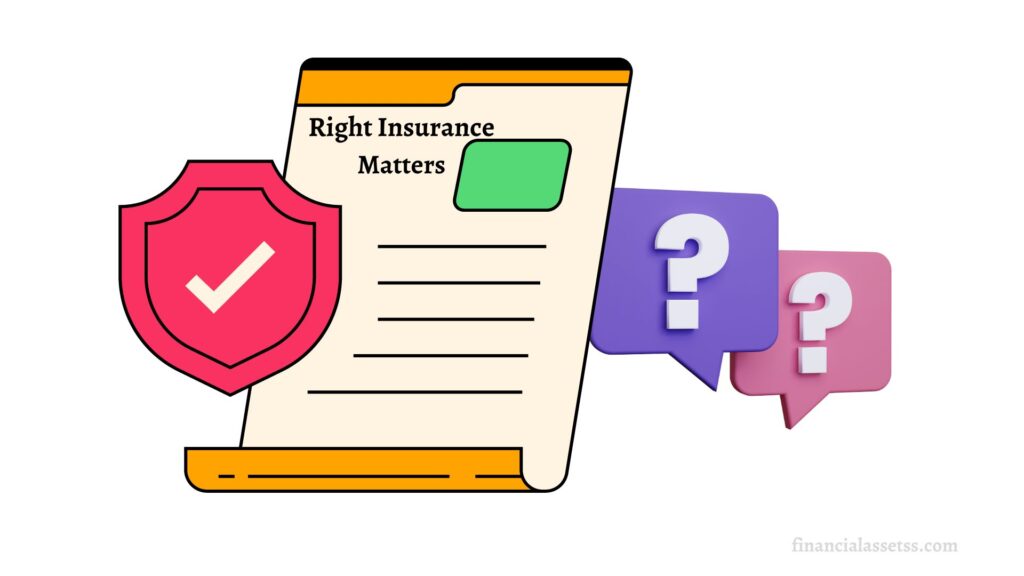Right Insurance Lumolog: Choosing the right insurance is essential for safeguarding your financial well-being and ensuring peace of mind. With a multitude of insurance options available, making an informed decision can be challenging.
This comprehensive guide will help you navigate the complex world of insurance, offering insights into assessing your needs, comparing options, and selecting the best coverage for your circumstances.
Whether you need insurance for personal or business purposes, this guide is designed to equip you with the knowledge to make well-informed decisions.
Why Choosing the Right Insurance Matters

Selecting the appropriate insurance coverage is crucial for protecting your assets and securing your financial future.
The right insurance policy provides a safety net in times of need, whether you’re dealing with unexpected health issues, property damage, or other unforeseen events. Here’s why making the right choice is vital:
- Financial Security: Proper insurance coverage ensures that you’re protected against significant financial losses.
- Legal Compliance: Some types of insurance, such as auto insurance, are legally required, and having the right coverage helps you comply with the law.
- Peace of Mind: Knowing that you’re covered in various scenarios can alleviate stress and provide a sense of security.
Understanding Your Insurance Needs
Right Insurance Lumolog: Before choosing an insurance plan, it’s essential to understand your specific needs.
Different types of insurance offer varying levels of protection and coverage, so it’s important to assess what you require based on your personal or business circumstances.
Auto Insurance
Importance: Auto insurance is not only a legal requirement but also crucial for protecting yourself and your vehicle in case of accidents or damage.
Coverage Types:
- Liability Coverage: This covers damages and injuries you cause to others in an accident.
- Collision Coverage: Pays for damage to your vehicle resulting from a collision.
- Comprehensive Coverage: Covers non-collision-related damage, such as theft or natural disasters.
- Uninsured/Underinsured Motorist Coverage: Protects you if you’re in an accident with someone who has insufficient or no insurance.
Assessment:
- Driving Habits: Analyze your driving patterns and the risks you face.
- Coverage Levels: Choose coverage levels that suit your needs and budget.
Also Read: Do You Need Full Coverage on a Financed Car?
Home Insurance
Importance: Home insurance protects your property and belongings from various risks, including damage and theft.
Coverage Types:
- Dwelling Coverage: This covers damage to your home’s structure.
- Personal Property Coverage: Protects your personal belongings inside the home.
- Liability Protection: This covers injuries or damages occurring on your property.
- Additional Coverage: Options like flood or earthquake insurance may be necessary depending on your location.
Assessment:
- Property Value: Ensure coverage matches the value of your home and possessions.
- Additional Risks: Consider additional coverage based on local risks.
Health Insurance

Importance: Health insurance is crucial for managing healthcare expenses and ensuring access to necessary medical services.
Coverage Types:
- Health Maintenance Organization (HMO): Requires using a network of doctors and getting referrals for specialists.
- Preferred Provider Organization (PPO): Offers flexibility in choosing healthcare providers and doesn’t require referrals.
- Exclusive Provider Organization (EPO): Covers care only within its network but doesn’t require referrals.
- Point of Service (POS): Combines features of HMO and PPO plans, requiring referrals but allowing out-of-network care.
Assessment:
- Medical Needs: Consider your healthcare needs, preferred providers, and any ongoing treatments.
- Budget: Choose a plan that fits your financial situation while providing adequate coverage.
Life Insurance
Importance: Life insurance provides financial security for your loved ones in the event of your death.
Coverage Types:
- Term Life Insurance: Offers coverage for a specific period and pays benefits if you die within that term.
- Whole Life Insurance: Provides coverage for your entire life and includes a savings component.
- Universal Life Insurance: Offers flexible premiums and benefits with a savings component.
- Variable Life Insurance: Includes investment options that can affect the policy’s cash value and benefits.
Assessment:
- Financial Obligations: Determine the amount needed to cover debts, funeral costs, and future financial needs.
- Policy Type: Choose a policy that aligns with your long-term financial goals.
Evaluating Insurance Policies
Right Insurance Lumolog: Once you’ve identified the type of insurance coverage you need, the next step is to evaluate and compare different policies. Here’s how to assess and choose the best policy:
Coverage Limits
| What to Check | Why It Matters |
|---|---|
| Ensure the policy offers adequate coverage for your needs. This includes understanding the dollar limits and the extent of coverage provided for various risks. | Adequate coverage prevents financial strain in the event of a claim, ensuring that you are sufficiently protected against potential losses. |
Deductibles
| What to Check | Why It Matters |
|---|---|
| Evaluate the deductibles associated with each policy. A deductible is the amount you pay out-of-pocket before the insurance coverage kicks in. | Higher deductibles typically result in lower premiums but can lead to higher out-of-pocket costs in the event of a claim. Choose a deductible that balances your premium costs with your financial capacity to pay out-of-pocket. |
Premiums
| What to Check | Why It Matters |
|---|---|
| Compare the premium costs of different policies. Premiums are the regular payments you make to keep your insurance active. | While lower premiums can be attractive, ensure that they do not compromise the quality of coverage. Opt for a policy that provides a good balance of coverage and affordability. |
Exclusions and Limitations
| What to Check | Why It Matters |
|---|---|
| Review the exclusions and limitations listed in the policy. These are conditions or situations that are not covered by the insurance. | Understanding what is excluded helps prevent surprises during a claim and ensures you are aware of any potential gaps in coverage. |
Additional Benefits
| What to Check | Why It Matters |
|---|---|
| Consider any additional benefits or features offered by the policy, such as discounts, loyalty rewards, or added coverage options. | Additional benefits can enhance the value of your policy and provide extra protection or savings. |
Comparing and Evaluating Insurance Options

To select the best insurance policy, you need to compare your options thoroughly. Here’s a step-by-step approach to evaluating insurance plans:
Assessing Coverage
How to Compare: Look at the specific benefits, limitations, and exclusions of each policy. For health insurance, this might include network coverage and prescription benefits. For auto insurance, evaluate liability, collision, and comprehensive coverage.
Why It Matters: Ensuring the policy meets your needs and priorities helps you choose the most appropriate coverage.
Comparing Prices
How to Compare: Obtain quotes from multiple insurance providers and compare them side by side. Evaluate the cost relative to the coverage provided.
Why It Matters: While price is important, ensure that the cost aligns with the coverage and benefits offered. Choose a policy that offers the best overall value.
Considering Additional Factors
| Factor | How to Compare | Why It Matters |
|---|---|---|
| Financial Stability | Evaluate the insurer’s financial ratings from agencies like A.M. Best or Moody’s. | Ensures the insurer can meet its financial obligations and handle claims. |
| Reputation | Research the insurer’s reputation through customer reviews and ratings on trusted review sites. | A good reputation reflects reliability and positive customer experiences. |
| Ease of Claims Processing | Look into the insurer’s claims process, including the ease of filing and average processing times. | Efficient claims processing minimizes hassle and delays when you need coverage. |
| Flexible Payment Options | Check if the insurer offers various payment methods and schedules, like monthly or annual payments. | Flexibility in payment options can help manage your budget and cash flow. |
Conclusion
Choosing the Right Insurance Lumolog policy is a critical decision that impacts your financial stability and peace of mind.
By understanding your specific needs, evaluating different types of insurance, and comparing policies thoroughly, you can make an informed choice that provides comprehensive protection.
By following these guidelines, you can confidently select an insurance plan that aligns with your needs and offers optimal protection.
For personalized advice and more information, consult with insurance professionals who can help tailor a policy to your specific circumstances. Friends, i hope this post make a sense and fulfill your requirements, if yes then please share it with your friends.
FAQs: Right Insurance Lumolog
Q: What factors should I consider when choosing insurance?
A: Consider coverage types, deductibles, premiums, exclusions, and additional benefits. Assess your needs and compare policies to find the best fit.
Q: How do I determine the right amount of coverage?
A: Evaluate your risks, financial obligations, and potential losses. Choose coverage that adequately protects against these risks while fitting within your budget.
Q: What is the difference between term and whole life insurance?
A: Term life insurance covers you for a specific period, while whole life insurance provides lifelong coverage and includes a savings component.
Q: Why is comparing insurance quotes important?
A: Comparing quotes helps you find the best price for the coverage you need, ensuring you get value for money and suitable protection.
Q: What are policy exclusions and why should I care?
A: Policy exclusions are specific conditions or situations not covered by the insurance. Understanding them helps prevent surprises and ensures adequate protection.
Q: How can I save on insurance premiums?
A: Consider higher deductibles, bundle policies, take advantage of discounts, and maintain a good credit score to potentially lower your insurance premiums.
Q: What should I know about insurance deductibles?
A: Deductibles are the amount you pay out-of-pocket before insurance coverage kicks in. Higher deductibles often mean lower premiums but more upfront costs during claims.
Q: Is it worth getting additional insurance coverage?
A: Additional coverage can provide extra protection for specific risks not covered by standard policies. Evaluate your needs and potential risks to decide if it’s worth it.
Q: How often should I review my insurance policies?
A: Review your policies annually or after major life events (e.g., buying a home, or changes in health) to ensure they still meet your current needs and circumstances.

